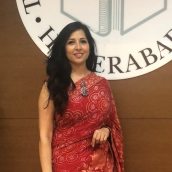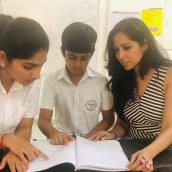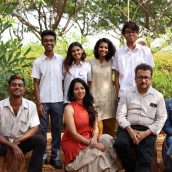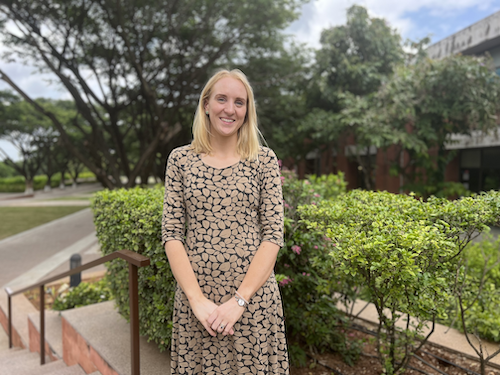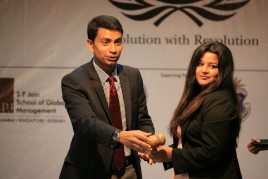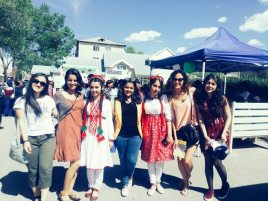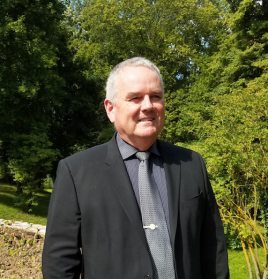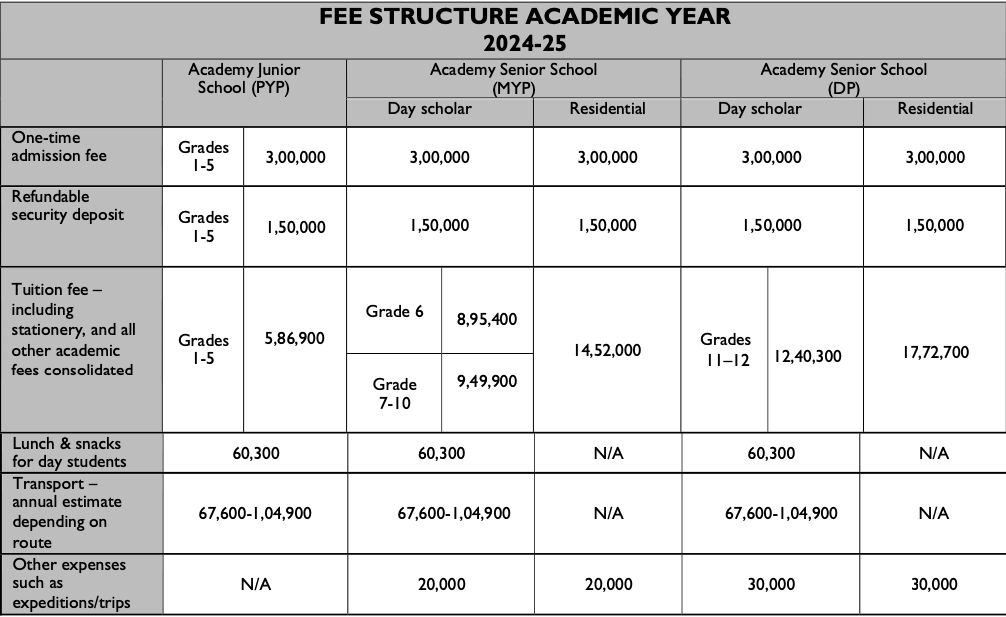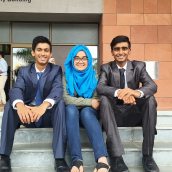Faridah Lakhani - epitomising self-learning and personal growth
Written by Kamini Menon
Khushboo Shah (Class of 2016): Using artistic talents to connect with others
Khushboo Shah is an aspiring writer, visual artist, and the current alumni representative of Aga Khan Academy Hyderabad 2016 batch. She is a recipient of The Aga Khan Youth Award for Excellence, and plans to begin her undergraduate studies this fall.
In August 2014, I migrated from my hometown Goa, India and traveled to the Aga Khan Academy (AKA) in Hyderabad to begin my International Baccalaureate education. In retrospect, AKA Hyderabad taught us all how to be independent in our own unique way. It strengthened my intellectual roots and taught me that it is okay to question. And because I questioned, I was able to learn.
At the Academy, I ardently loved studying English, history and visual arts – they groomed me to be a principled thinker and ethical person. The Academy under the vision of His Highness the Aga Khan does an excellent job of grooming each one of us to be a risk taker and a leader. Prior to joining the Academy, I was always interested in visual art, but I did not know how to pursue my passion. Under the apt guidance and encouragement from my art teachers, I learned how to weave my passion for history and literature into art. I also received an opportunity to present my artwork to the Premier of Ontario, the Honourable Kathleen Wynne, on her visit to the Academy in Hyderabad in early 2016. The Academy’s brilliant framework allows each individual student to pursue his/her inner talent and vision. I had always wanted to develop my writing and leadership skills, and I was able to do so by serving as the editor of the Academy’s 2014-2015 Yearbook. I also served as the elected Student Council President for the 2015-2016 year. Serving as an editor gave me confidence to take my writing seriously, while being a student leader allowed me to become a responsible and thoughtful individual.
In January 2017, I was awarded the Aga Khan Youth Award for Excellence, which has humbled me and allowed me to believe that with the right balance of determination, hard work and guidance, an individual can achieve immensely. I also serve as the alumni representative for the Class of 2016. I believe that because of the Academy’s presence in my life, I have truly been able to strive towards my goals. From April 2017 to June 2017, I interned at the Naryn campus of the University of Central Asia (UCA) in Kyrgyzstan. When I was in Kyrgyzstan, I experienced the overlapping of multiple cultures, faiths, nationalities, and ideologies. I was able to share meals and go trekking with more than eight nationalities at once! My circle now includes friends from Kazakhstan, Tajikistan, Kyrgyzstan, Pakistan, Afghanistan, Canada and the United States, making me extremely grateful for all my experiences and encounters.
At UCA, I was also required to assist with Student Life activities and other administrative work. Along with the University Counselor and other Student Life team members, I planned the cultural excursion to Lake Issyk Kul; and under the guidance of the Student Life team, I also organised the Hakuna Matata festival, which was organised partly on the Easter weekend as an arts and craft night, and as an Amazing Race all across Naryn town. Never before had Naryn seen such a race where the students were asked to complete tasks like building sand castles by the river, wearing traditional Kyrgyz clothing, competing against other teams over the game of foosball and conducting interviews with local people. All students were given a budget through which they had to complete their tasks. Students had to take cabs, the ‘mashrutka’ (local bus), or share a ride to reach into town. The race was a great experience as the students were not only challenged to try new things, they also learned to enjoy working collectively in teams. All the leadership qualities which I had acquired at AKA Hyderabad helped me to positively lead this activity. I believe that the Academy’s dynamic vision has allowed me to believe in my imagination, passion and curiosity while pursuing ambitious projects.
His Highness the Aga Khan emphasises that for one to become a global citizen, one must be multilingual. In Kyrgyzstan, I picked up some Russian, and thus was able to communicate a little with the local citizens – once on a taxi ride back from the local bazaar, a local lady whom I had never met before, moved me as she invited me to her house for lunch! That day I understood how by trying to speak the local language, I was not only learning a new skill, but was also breaking the barrier between myself and local citizens, and in a broader perspective – between two communities. Furthermore, on helping the UCA students to organize the first ever TEDxUniversityofCentralAsia, I truly understood the importance of embracing the diversity of different cultures as the event saw the coming together of over nine nationalities, and this collaboration truly humbled me.
When I look back at my Academy years, I often feel humbled and nostalgic. The time spent amidst those red bricked walls, with lovely friends and extremely supportive teachers has been one of the best times in my life. I have realised that an individual can continue to grow, learn and excel throughout their life. I am extremely grateful for the wonderful education I have received – it has been my sincere effort to try and improve in everything that I do by striving to become a more resilient and grounded person.
By Khushboo Shah
Jonathon Marsh: Supporting the quality of teaching at the Academies
Jonathon Marsh has system-wide responsibility for teacher development at the Aga Khan Academies network. Having worked for the Academies for the past 10 years, he has previously had leadership roles in education in Canada, Hong Kong, the United Arab Emirates and the United Kingdom, including as the Head of Professional Development and Research for the International Baccalaureate. In this interview, he shares the highlights of his position at the Academies, and reflects on how the Academies are unique from other educational institutions.
Tell us the journey that led you to the Academies.
I first came across the AKDN when I was in Hong Kong. I read a recruitment ad in the Times Higher Education magazine seeking people to fill positions at the then recently opened Aga Khan University in Karachi. I remember looking at the ad and experiencing a strong sense of conviction that one day I would work for this organisation. More than a decade later, while working at the IB, I was introduced to Salim Bhatia [Director of Academies] by the then Chair of the IB’s governing council. Salim asked me if I knew anyone that would be interested in taking a lead role in teacher development for the emerging Academies. At the same time, he was in discussion with Monique Conn, who was my line manager at the IB, about the position of Academic Director. Monique accepted the position soon thereafter and persuaded me to join as well.
What is the most rewarding aspect of working for the Aga Khan Academies?
I think the majority of my colleagues would unanimously reply “the students”, and they would be right to do so. However, for me the job is about quality teaching, and having the opportunity to really influence the discourse on teaching and learning in the countries and regions we work within is very exciting. Having a chance to work both at the high end with government ministries, NGOs and universities and at the chalk face with individual teachers, especially young people new to teaching, provides me with a full spectrum of very meaningful and satisfying engagements.
What led you to choose your particular career?
I don’t see it as a career but rather as a vocation. I see the profession of teaching as critically important to the health and ongoing development of any society. As such, I can think of no better way to contribute to the betterment of humanity.
What attracted you to the Academy?
First and foremost, the vision and mission. Especially attractive is His Highness the Aga Khan’s insight into the importance of the profession of teaching and the need to restore its much diminished status in the various geographies within which the Academies are located.
Reflecting on your time at the Academy, is there a particular day that was especially rewarding and memorable?
There are too many to count. Among them perhaps two stand out: 1) the graduation of the first cohort of teacher interns completing the Teacher Preparation Programme (TPP), and 2) becoming the first (and as yet only) school network in the world to offer a teacher development programme recognised under the IB Educator Certificate initiative. The building of the TPP and overcoming the many associated challenges took an extraordinary amount of effort, with contributions coming from many people. Seeing it come to fruition was very gratifying.
How do you think you contribute to the inner workings of the Academies and to the achievement of its goals?
I work collegially with the Heads and senior staff in each Academy to think through and implement systems to support the quality of teaching across the network. This includes working with both external and internal providers to source and implement professional development programmes; liaising with universities and other AKDN agencies to define and conduct research and development projects; providing support for the collection and analysis of standardised data; ongoing development and application of the Academies’ teacher appraisal programme; specifying career pathways for teachers; and contributing to the specification of the Academies outreach strategy.
What sort of positive impact have the Academies had on you?
I have gained a great deal of knowledge and understanding around what it takes to start up a high quality school. I have also gained a great deal of insight into the full complexity of running a school. I have always had a great deal of admiration for those brave and committed enough to teach, but my admiration has grown considerably for those who continue to do so under very difficult circumstances.
In what ways has the Academy helped you to become a more effective advocate in the education world?
I am nearing the end of my professional life (I am not really sure what that means other than a euphemism for being over 60), and my role in the Academies has provided me with a unique opportunity to apply much of the knowledge and understanding I have gained over the years. I have drawn upon my background in philosophy and spirituality to better ground my efforts to develop systems within His Highness’s vision for the Academies. I have drawn upon my studies in educational technology to inform system development. My time at the IB has helped me to understand the particular needs of IB teachers and how to support them. The years spent in tertiary education have enabled me to better liaise with universities and support research and data collection. Working with the Academies has allowed me to not only to promote principles of good practice and high quality education, it has provided me with a platform to do so in places that are hungry for change and very much in need of educational reform.
How would you describe the teacher development work with which you engage?
I would describe it as very rewarding precisely because it is very challenging. When it comes to teacher development, we are dealing with many layers of readiness among practitioners. Each country has its own approach to teacher preparation, and within each country not all teachers are given equal standing. For example, senior school teachers are typically better trained and better paid than junior school teachers. Junior school teacher preparation often does not involve gaining a university degree, and only those who could not get into a university opt for junior school teacher training programmes. Convincing people that teaching young children is at least as complex and difficult as teaching older kids is surprisingly difficult. Yet how are we supposed to achieve the kinds of sophisticated learning outcomes envisioned by His Highness if we do not prepare students for them right from the beginning? Building the necessary culture of professional respect for the expertise of all teachers, and indeed helping teachers to define and value their own professional identities is particularly important and very challenging.
What do you think sets the Academies apart from other educational institutions?
The Academies are not unique. There are other schools around the world which share many of the same attributes. However, they do have some very interesting defining characteristics. Firstly, the degree to which they are vision and mission led is compelling for many. Secondly, the commitment they have to provide access to excellent education to talented kids regardless of their ability to pay. Thirdly, their commitment to serve the countries they are in by providing an international standard of education for a majority of local students and employing 80% local teachers. Lastly, their rootedness in the local community and their ability to draw upon the many strengths of the wider AKDN as well as the committed and generous support of the Ismaili community.
How do you think the Academies ensure a climate of pluralism?
The Academies strive to value each child and each member of staff as a unique individual, and expect each to make a unique contribution. A pluralistic perspective is promoted by bringing together individuals from across cultural boundaries, tribal lines, disparate geographic locations, genders, ages, faiths, and economic backgrounds and providing them with a continuous and intensive opportunity to engage with, understand, and come to value each other’s “otherness”.
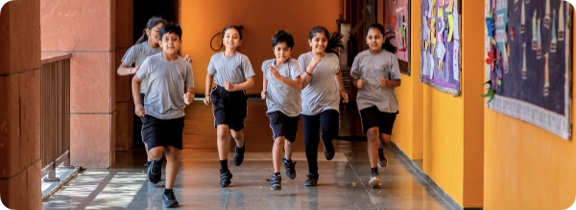
Fee Structure
Please click here to download the Fee Structure for the 2024-25 academic year.
NOTES:
- A one-time, non-refundable admission fee is payable for students enrolling for the first time. The admission fee must be paid to secure a place for a child at the Academy. This cannot be deferred or paid in instalments. The due date is one week after the offer has been accepted.
- A one-time refundable security deposit is also payable on acceptance of admission and should be paid together with the admission fee mentioned above. It is refundable when a student leaves the Academy as long as the required notice has been given in writing and “No Dues” clearance is obtained from the Academy. No interest is payable on this deposit.
- A sibling discount on a tuition fee of 5% will be applicable for second and subsequent children.
- The total fees for the academic year may be paid in full with an early-payment discount of 3% on or before 31 July 2024.
- The fee is payable on due dates as mentioned in the invoice/memo for the services.
- The Academy will charge a monthly surcharge of 2% on outstanding dues older than 30 days. In case the full fee that is due is not paid within one month period following the deadline, the student will not be allowed to attend classes or participate in other activities undertaken by the Academy.
- The Total Fee includes course fees, use of essential course books, library books, IT and science laboratory equipment and certain classroom supplies. The fees do not include uniform costs.
- Exam Fees for the IB Middle Years Programme and the Diploma Programme will be billed separately based on the actual fee issued by the International Baccalaureate Organization (IBO).
- Parents of returning students will be invoiced four to six weeks prior to the new Academic Year.
- The Academy does not accept cash for Fee payments. All payments must be made by Direct Bank Deposit, Bank Transfer, Cheque or Demand Draft even if the payment is being made by a third party such as a sponsoring organization. Parents must provide the Finance Office (finance@agakhanacademies.org), with a hard or an electronic copy of proof of payment showing the student's full name and the student identification number within 15 days of fund transfer for issuance of payment receipt. The absence of this information may delay crediting the fees reflected on your account in our system.
- Parents are responsible for ensuring that the fee payments are made into the correct bank account of the Academy. In the event of any change in bank account details, the changes will be communicated to parents in writing via official communication from the Academy with new payment bank details.
- If a student wishes to leave the Academy, one term’s advance notice of withdrawal must be given in writing, or one term’s worth of the annual fees will be due and payable. School clearance will not be possible until all outstanding dues are settled in full. Please refer to the points for withdrawal under number 12 in the PDF document above.
- The Academy reserves the right to withhold results, school certificates, transcripts or any other information and/or documents until all outstanding dues are settled in full.
- Admitted students, who demonstrate financial need and duly fill in and submit the application along with required supporting documents within the stipulated time, can be considered for Financial Aid. An independent Financial Aid Committee is responsible for reviewing and approving any request for Financial Aid by students.
- The above terms and conditions may be modified or new terms may apply to reflect changes in the law or our services. For further information, please contact us at admissions.hyderabad@agakhanacademies.org.
- Please note that the Fee Structure is subject to annual review.
Happy Children's Day - Tuesday 14 November
Special morning assembly in Junior School and afternoon assembly in Senior School to increase awareness of the rights, care and education of children!
Dania Quadri (Class of 2014): Giving back as an alumna
“Being part of an open-minded community that encouraged challenging what we were taught, the willingness to accept one another, and inspire each other to grow constantly, was very refreshing. I credit these experiences for much of whom I am today.”
– Dania Quadri, Academy alumna, class of 2014.
“As I aspire to be a doctor, I feel that it is necessary to acquire experience in a role that demands care, patience and a great deal of understanding,” she explains. “I knew teaching and organising the MHAW would contribute to my personal growth and career aspirations but would also allow me to give back to my school – something very important to me.”
Through MHAW, Dania was able to contribute to reducing stigma associated with mental illness within the Academy community. “As a student myself, I know how hard it is for students who are mentally unwell to cope with studies and social life at school. I wanted to spread awareness about it being perfectly normal to feel mentally unwell, to know the difference between clinical illness and just a rough emotional phase, and to encourage students to seek help and advice if they're feeling low.”
Her internship made her realise that she was more passionate about education than she thought. She particularly enjoyed the responsibility an educator has in developing a student’s personality and knowledge. “As a teacher, it was interesting to observe school from the other side. Spending time with all the teachers made me realise how much they actually care for their students. The support is incredible at the Academy and different learning abilities are not only understood but truly valued.”
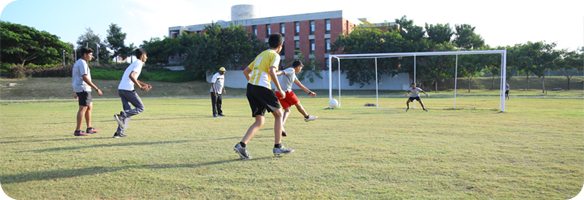
Enrichment Programme
The enrichment programme enables students to realise their potential in a variety of settings beyond the classroom. Students develop a sense of self-awareness and an understanding of school and community needs and opportunities. They also learn how to apply their gifts and skills to make a positive impact.
At the Academy, we believe in a balanced, rounded, comprehensive school experience. As this includes both academic and enrichment experiences, we encourage our students to do their best both in and outside the classroom.
We offer outstanding sports facilities that include:
- swimming and diving pools
- cricket pitch
- sports fields, for soccer, hockey and athletics
- tennis and squash courts
- athletics track.
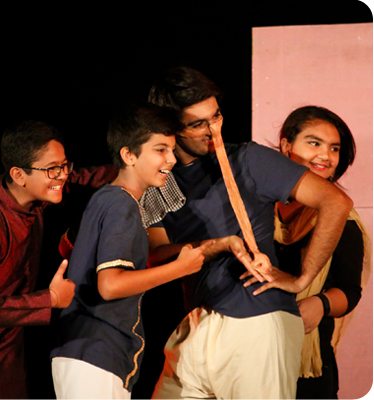 Children with special sporting gifts are encouraged to develop their talents in every way. Children with special gifts in music, art or drama are similarly encouraged through opportunities to practise and perform while at the Academy.
Children with special sporting gifts are encouraged to develop their talents in every way. Children with special gifts in music, art or drama are similarly encouraged through opportunities to practise and perform while at the Academy.
Our enrichment programmes for both day and residential students are clustered into three main streams, each with a different focus:
Creativity and culture
Whether through visual or performing arts, this cluster engages students to think creatively and express their identities and thoughts aesthetically. Through theatre, art, music and drama, students learn to work together and infuse their projects with values and lessons from other parts of their schooling. Individual and collaborative creative projects emphasise growth and development through personal challenge, ultimately resulting in achievable personal goals.
Programmes are currently offered in contemporary dance, arts and crafts, animation, robotics, science, software, photography, chess, drama and music.
Physical
The student as a reflective practitioner is a basic tenet of the physical cluster. Through physical sport, both competitive and non-competitive, students are challenged in their physical growth, and learn values such as good sportsmanship, teamwork and ethical behaviour. We encourage them to extend themselves by trying different activities and working with teammates to pass on their knowledge. In line with developing the student as a whole, a healthy lifestyle complements and enhances academic achievement.
Programmes are currently offered in football, squash, basketball, cricket, swimming, table tennis, tennis and yoga/gym.
Language and service
At the Academy, we encourage knowledge and understanding of humanity and civil society. Through their involvement in citizenship activities, students gain an understanding of the practical implications of their work and study. By collaborating with community groups on sustainable projects, they develop an appreciation for human rights and human dignity, and of how their actions impact the world around them.
Programmes are currently offered in Model United Nations, Reflections (school publication), yearbook, organic farm, film making, book club, foreign language and mother tongue, and environment club.
To learn more about the Academy's programme, please visit the Academic Programme page.
Admissions Talent Identification – 15-16 April, Gujarat
Meritorious students identified by Aga Khan Rural Support Program will be assessed in Sayla and Rajkot this weekend for entry into grade 7.
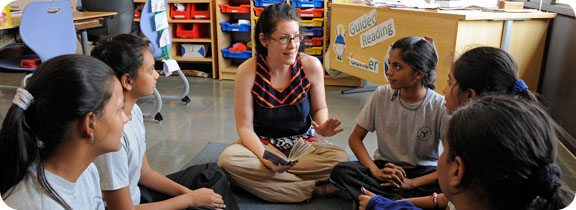
Employment Opportunities
The Aga Khan Academies is committed to hiring the best educators and support staff from their local communities and from all corners of the globe. The skills and ideas of the educators and staff are central to the student experience and to the Academies’ commitment to excellence.
The Academies provide a unique and exciting work environment for teachers, facilitators, facilities managers and administrators. Educators and support staff are encouraged to innovate continually and are given regular opportunities for professional and personal development.
Through teacher education and local capacity building, the Academies aspire to raise the status of the teaching profession and create conditions for growing numbers of talented people to explore a career in education.
Employment opportunities at the Aga Khan Academies are listed as they are made available on the AKDN Career Centre.
For more information about employment at the Aga Khan Academies or in the Aga Khan Development Network, visit the AKDN Career Centre.
